I have the following sproc:
CREATE PROCEDURE [dbo].[dapper_test_sproc]
AS
BEGIN
SET NOCOUNT ON ;
DECLARE @Status INT = 1
DECLARE @Msg VARCHAR(256) = 'Hello World'
DECLARE @StatusLines TABLE
(
rule_code VARCHAR(20),
rule_name VARCHAR(30),
[status] INT,
rule_error_msg VARCHAR(256)
)
INSERT INTO @StatusLines
VALUES ('TEST1', 'TEST2', 1, 'TEST3')
SELECT @Status,
@Msg
SELECT rule_code,
rule_name,
status,
rule_error_msg
FROM @StatusLines
FOR XML RAW
END
At the end of the sproc you can see two result sets.
I have used the following code in LinqPad to successfully query the data but I am struggling to get individual values out of the data. I do not understand the return types.
using var connection = this.Connection;
var sql = "dapper_test_sproc";
var p = new DynamicParameters();
var grid = await connection
.QueryMultipleAsync(
new CommandDefinition(
sql,
p,
commandType: CommandType.StoredProcedure,
cancellationToken: this.QueryCancelToken));
LINQPad.Extensions.Dump(grid.Read());
LINQPad.Extensions.Dump(grid.Read());
LinqPad shows the following information:
For example, calling grid.Read() does not return the full @Status and @Msg from the first result set. But I found out that grid.ReadSingle() does. And I have no idea why.
grid.ReadSingle()["Status"] throws an error Cannot apply indexing with [] to an expression of type 'object' okay so its an object, but what kind of object? And why cant I access any properties?
I now have working code, but the code is horribly ugly. The casting, and accessing elements at indexes seems highly error prone. Is there a better way to do this?
public async Task dapper_test_sproc()
{
using var connection = this.Connection;
var sql = "dapper_test_sproc";
var p = new DynamicParameters();
var grid = await connection
.QueryMultipleAsync(
new CommandDefinition(
sql,
p,
commandType: CommandType.StoredProcedure,
cancellationToken: this.QueryCancelToken));
var firstResultSet = await grid.ReadSingleAsync();
var secondResultSet = await grid.ReadSingleAsync();
var firstResultSetDict = (IDictionary<String,Object>)firstResultSet;
var statusBit = (int)firstResultSetDict.ElementAt(0).Value;
var message = (string)firstResultSetDict.ElementAt(1).Value;
var secondResultSetDict = (IDictionary<String,Object>)secondResultSet;
var statusLinesXML = (string)secondResultSetDict.Single().Value;
var passwordValidationStatusMessage = new PasswordValidationStatusMessage
{
Error = !Convert.ToBoolean(statusBit),
Message = message
};
XmlSerializer serializer = new XmlSerializer(typeof(StatusLinesEnvelope));
using var reader = new StringReader($"<root>{statusLinesXML}</root>");
var statusLines = (StatusLinesEnvelope)serializer.Deserialize(reader);
LINQPad.Extensions.Dump(passwordValidationStatusMessage);
LINQPad.Extensions.Dump(statusLines);
}
[XmlRoot(ElementName = "row", Namespace = "")]
public class StatusLines
{
[XmlAttribute(AttributeName = "rule_code")]
public string RuleCode { get; set; }
[XmlAttribute(AttributeName = "rule_name")]
public string RuleName { get; set; }
[XmlAttribute(AttributeName = "status")]
public bool Status { get; set; }
[XmlAttribute(AttributeName = "rule_error_msg")]
public string RuleErrorMsg { get; set; }
}
[XmlRoot(ElementName = "root")]
public class StatusLinesEnvelope
{
[XmlElement(ElementName = "row")]
public List<StatusLines> Row { get; set; }
}
public class PasswordValidationStatusMessage
{
public bool Error { get; set; }
public string Message { get; set; }
}

